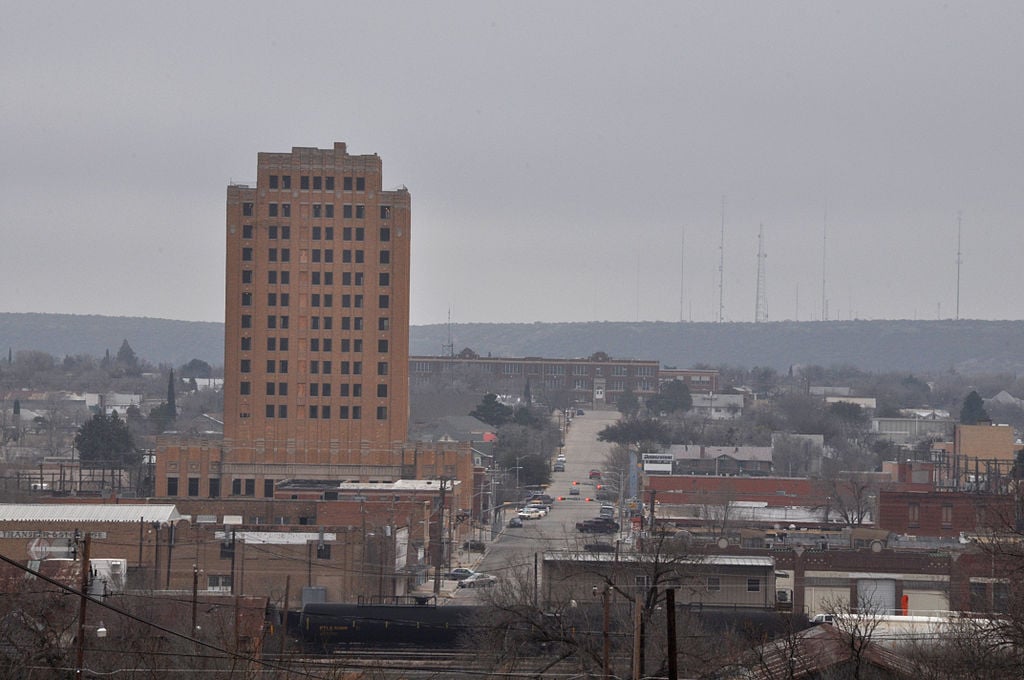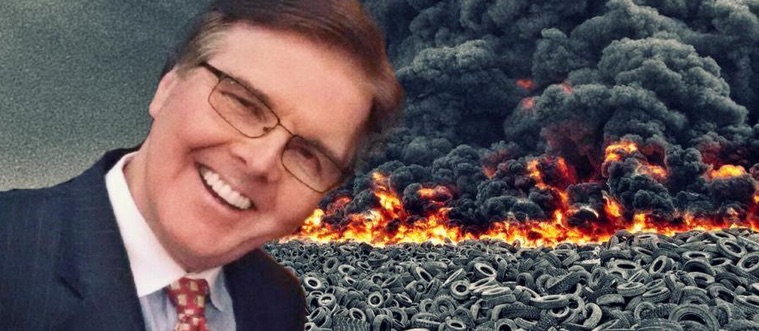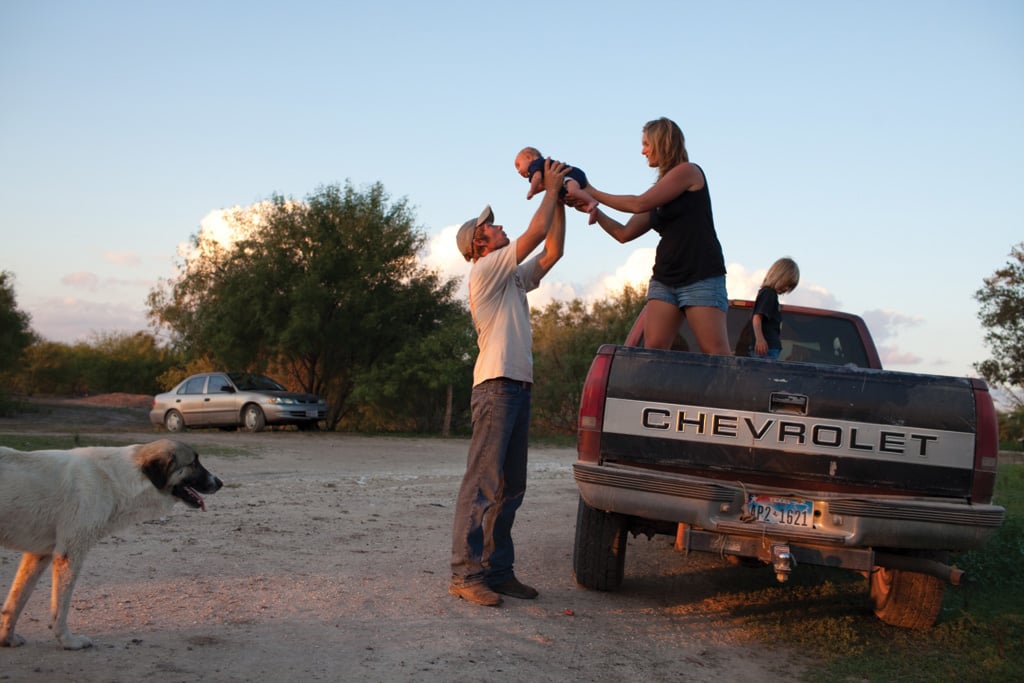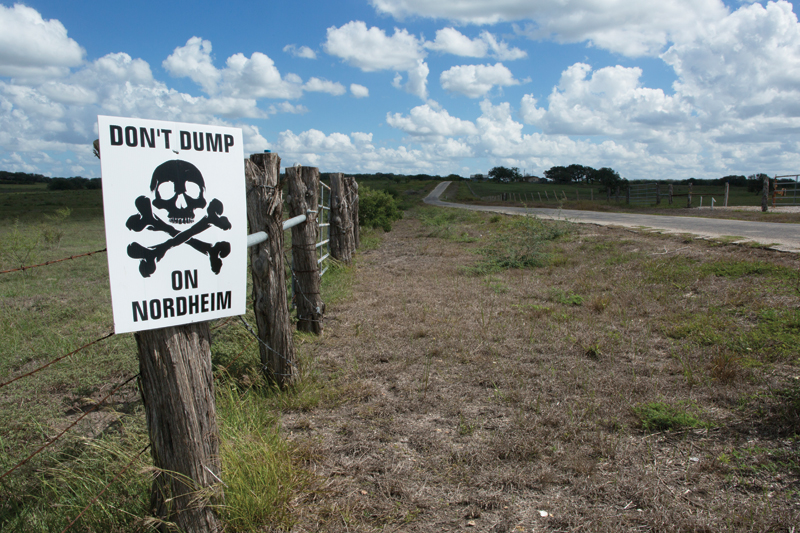
Pit Stop
Nordheim inherits the waste, and few of the profits, from the South Texas oil boom.

A version of this story ran in the November 2014 issue.
The fracking boom has transformed vast parts of Texas, pumping money into local economies while raising fears about groundwater and air pollution. The boom has caused increased crime and truck traffic, and has likely spawned earthquakes. But the oil and gas bonanza has also brought more subtle, but no less significant, social changes. In this occasional series, we will examine how the oil economy has fractured families, communities and towns.
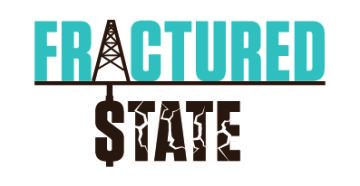
If you’re in Nordheim on a Thursday morning, chances are you’re heading to Elo Pfeifer’s place on Broadway. That’s the day Pfeifer smokes the sausages that some say are the best for miles around. They sell out fast. Unless you’ve ordered them beforehand, you’re probably out of luck.
Pfeifer has been cooking barbecue and selling goods from his non-air-conditioned general store since he sold the bar across the road in the early 1970s. Broadway Grocery has now become something of an institution in this tiny South Texas outpost of about 300 residents, an hour southeast of San Antonio.
Aside from Pfeifer’s store, and the bar that has stood on the corner of Broadway and First Avenue since 1933 and a school that teaches through 12th grade, there isn’t much to Nordheim except for shuttered-up storefronts and a population in decline.
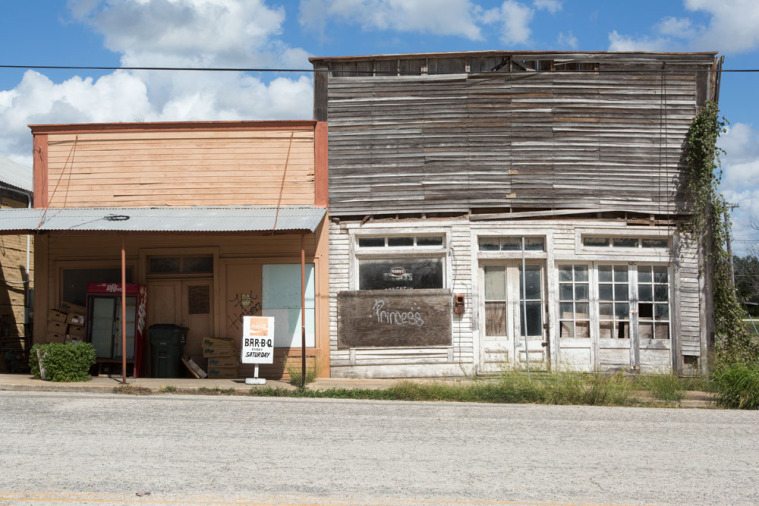
But it shouldn’t be this way—and perhaps won’t be this way for much longer. Nordheim is surrounded by oil. A few years ago, DeWitt County, situated over the Eagle Ford Shale, exploded with one of the biggest oil booms in the country. As the Observer noted in 2011, nearby Cuero went from quiet ranching town to oil boomtown in just a few years. Cuero attracts about $250,000 a year in sales taxes from local businesses and makes $30,000 a month selling its water to oil companies for use in the fracking extraction process.
At City Hall, just across the road from Pfeifer’s store, Nordheim’s mayor, Kathy Payne, sits behind a large wooden meeting table flanked by U.S. and Texas flags. As a small-town mayor, she’s tied into nearly everything that happens in Nordheim. “People call me if the bank doesn’t open on time, if the grocery store doesn’t open. If there are any problems, they’ll call here,” she says. On the desk in front of her, Payne has a rolled-up blueprint of the town, sketched by city planners in the 1920s. She unfurls it and points to City Hall, then moves her finger across the paper. “It looks like they were planning on the town expanding; were planning on it really growing,” she says. “There was a lot of farming back then.”
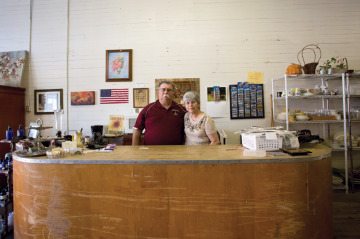
But Nordheim didn’t grow. In fact, it’s almost impossible now to picture it as a town that once boasted 27 stores, five beer joints, five gas stations and a population double what it is today. “Back in the ’20s, a lot of kids stayed on at the farm after graduating,” Payne says. Cotton and corn were the biggest industries, and she remembers the backbreaking work in the fields: “All the kids would do it. We’d have a bag strapped to us and get 5 cents for 100 pounds of cotton. It was hard work. We’d start early in the morning, get a lunch break, then we’d be back out again till dark. School would usually start in September, but it had to be delayed ’cause all of us had to go to work on the farm. There were three cotton gins. All closed.”
Payne says Nordheim’s decline began in the 1950s when kids started going away to college. “I was born in 1936 and graduated in 1955 from Nordheim High School, but out of 15 people in my class, just one person stayed,” she says. “Most of the boys went into the service. A lot of girls went to San Antonio to business school or college.” She got married a year after she graduated and, with her husband, a petroleum engineer, moved first to Corpus Christi, then to Robstown, Texas City, Houston, Chicago and Denver. Fifty years later, she returned home. “In 1984 my husband passed away. I was working as a high school coach in Denver, and I later decided to move back to Nordheim,” she says. She’s been back a decade, and has served seven years as mayor. Despite the changes, she says, the town still has a strong community spirit. But that spirit won’t fix the roads or boost a town that remains stagnant while so many of its neighbors get rich.
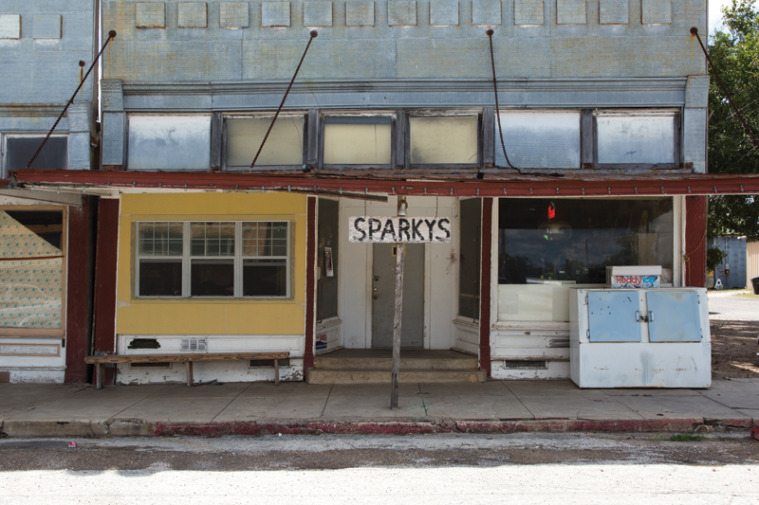
Last time I visited Nordheim, in fall 2013, I learned that the roads had been torn up by oilfield trucks barreling through town day and night. Back then, Payne told me Cabeza Road was so bad that she’d had to shell out for caliche to fill in the holes (she couldn’t afford asphalt). Then the town’s residents complained about all the dust the caliche was causing. Payne felt helpless. The county eventually had to pay for resurfacing. Payne also refused to sell any of Nordheim’s water to fracking companies. She says she can’t preserve the water supply because other entities pull from the same aquifer. But if the town does run out of water, at least she can say she never sold any of it. But that decision also deprived the town of revenue.
“It’s hard to see those other towns getting rich, like Cuero and Kenedy,” Payne says. She knows the roads in Nordheim need repairing. City Hall, too, has seen better days. And she knows she needs to attract more businesses to town. The answer, she believes, could arrive if oil companies soon find oil under the town. If there is, “whatever money we get will go straight to our streets. City Hall is not the prettiest place, but I’ll fix the streets before I fix this.”
“This fracking boom has been very good for us,” she says, “but it would be better if it would come under my town. Then I would get some money. Because then I could fix my streets.”
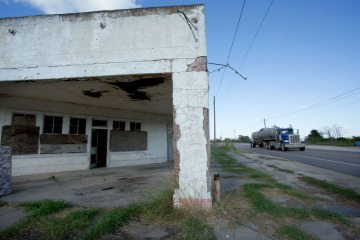
But, as always in the shale boom areas, the potential for profit comes with a cost. The engineering firm Pyote Reclamation Systems has proposed a disposal well for fracking waste in town that has enraged some Nordheim residents. The Texas Railroad Commission initially denied the proposal last year due to pollution concerns and protests by residents. The current application means fracking waste will evaporate from open, “un-capped” pits, and allow 1,000 gallons per acre per day to leak from the collection pit, and 100 gallons per acre per day to leak from the trenches.
Interestingly, since I last visited, Mayor Payne has become more receptive to the oil companies—a move that has alarmed some of her former champions. “I don’t think [the disposal well] should be that close to the city,” she tells me, “But if it’s put in right … controlled right … I’m neutral. You’ve got to listen to both sides.”
Payne shows me a map of where the disposal site would be located, on Hohn Road, a quiet country lane on the outskirts of town. It’ll be 25 feet deep, with a 4-foot berm around the site. There will be five wells, and she says each will have to be tested once a month. “Landowners are worried,” she says, “but the lining of the pits are as thick as tires. Thirty years from now, when they’re full, it’ll look like a field.”
Payne says they’re drilling so many wells nearby, “where do you expect them to put the waste?” And therein lies the rub. The Nordheim residents opposed to fracking because of environmental concerns think their mayor has turned against them. The mayor, meanwhile, thinks the disposal well could be good for her town’s sagging economy.
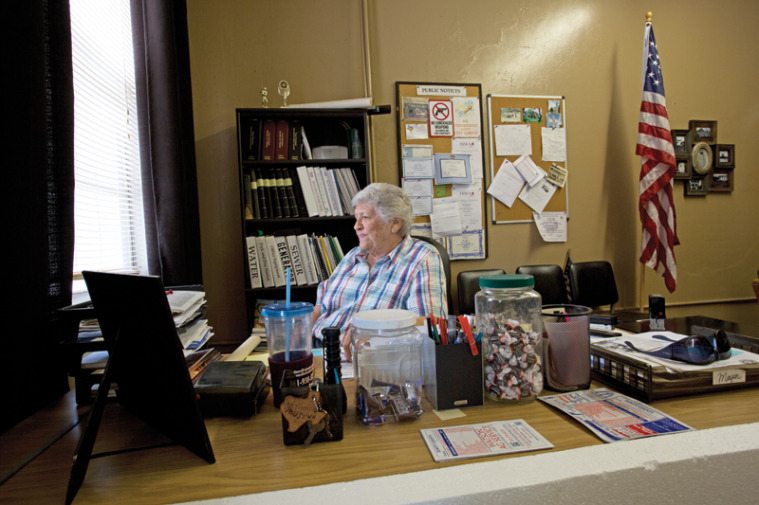
Margie Hull and her husband Patrick live across the road from the proposed disposal pit. They’ve lived in the same house for 30 years and run a real estate business. They also take in stray dogs, and Margie tells me she worries about the chemicals blowing toward the house. She’s concerned about the smell, the health implications for her and Pat, and the danger the truck traffic could pose to their animals. “If they build it, I do not want to live here,” she says.
Larry Baucum, a retired school maintenance mangager who co-owns the local mercantile re-sale shop and is a volunteer firefighter, says the fracking boom has been good for Nordheim. “It was a sleepy little town, really good to retire in, most of our students that graduated from here would leave and just come back to visit their parents,” he says. “You only had farming or ranching. That’s it. Until the oil fields came.”
But, he adds, “My own personal opinion, if those pits go in, this town will be dead in five years. Destroyed, and a ghost town. You can live with the smell if you get all that money, but you can’t if you get sick all the time.”
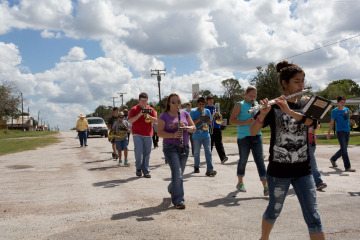
Opposite the proposed disposal well site is a gate that opens onto sprawling fields; attached to the gate is a black-and-white sign of a skull and crossbones and the words “Don’t Dump on Nordheim.” Scrawled in handwriting next to it: “Proverbs 13:1—Heareth his Father’s instruction.” A similar sign a few feet farther down the fence reads: “A Christian would not impose this on his brothers and sisters.”
Kevin Styra—who was born 8 miles up the road from here and who now runs the farm that has been in his family for 118 years—put the signs up and wrote those messages to the oil companies, and to the landowner who leased them the land for the disposal wells. As a kid, Styra would bale hay and help his uncle run cattle on the family’s land. Today he’s been out tilling the fields with the help of his 10-year-old daughter, Emagen, while keeping a close eye on the number of trucks heading down the gravel road opposite his gate.
Back in his air-conditioned farmhouse, which he built five years back, Styra sits at the dinner table wearing a blue shirt and jeans. “Few will prosper, and many will suffer,” he says. “I’ve lost my respect for the mayor. She took such a strong stance [against fracking waste] at the beginning. If she has a point of view, she should make that clear. I don’t see how you can be against something then for something of this caliber.”
Styra worries about runoff water from the pits—“I don’t believe a 4-foot berm will stop that water”—and about contamination, not just of his drinking water, but of his cattle too. “And flooding, it rained for an hour, and it looked like a small river under my culvert there,” he says. He’s also concerned about the fumes and about potential spills: “I don’t want to up sticks and go. We just built this house, and I spent a lot of my hard-earned money, saving yesterday to live tomorrow with the blessings from the good Lord above.”
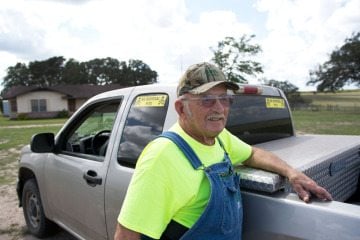
Styra isn’t anti-oil. In addition to running his farm, he works shifts on an offshore drilling rig. He just doesn’t think the disposal well should be so close to people’s homes—or the nearby school. As for the scripture he wrote on the signs opposite the proposed disposal well site? “It’s a message to them and anyone else who sees it,” he says. “That everything has a moral and a story to it. You reap what you sow.”
Just up the road from the waste site, Marvin Pilsner dangles his legs off the back of his flatbed, sipping cherry soda under the shade of a Chinese Pistache tree, trying to escape the heat. He’s called Nordheim home for each of his 79 years. There are only a handful of houses out here off Hohn Road; it’s mostly fields. Pilsner likes to call his plot of several hundred acres “the suburbs.”
He married a girl from Cuero—the 1956 Gobbler Queen (Cuero holds an annual Turkeyfest)—and worked as a mechanic at a little shop on his property until 1984, when he moved the business into town. He still found time to raise cattle, but by 2005 he’d quit farming and leased out some of the land. He’ll never leave, but now he’s worried: More trucks have been rumbling down Hohn Road before disappearing along a dirt track that leads to the site of the proposed waste disposal pit. It’s the only thing that breaks the silence of a late-summer afternoon.
Jen Reel contributed additional reporting.
To support journalism like this, donate to the Texas Observer.
